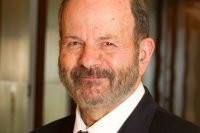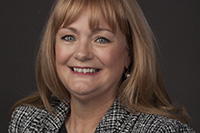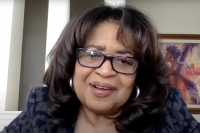
Recently retired after more than 58 years in law practice, Joseph D. Ament’s resume speaks for itself— Valedictorian of the Class of 1962, a successful CPA, a founding member of Much Shelist Freed Denenberg Ament and Eiger (now Much Shelist), and a full-time faculty member of Roosevelt University’s Department of Accounting and Taxation for 45 years. Mr. Ament has also served as a representative of the Braun Fund, which supports the Law School’s Braun Memorial Symposium, since its inception 26 years ago. It was an honor to catch up with Mr. Ament over zoom and get the stories behind his notable success.
Law School: Before attending law school, you had a career as a CPA. Why did you choose to attend the Law School, and what did you know about the Law School before you enrolled?
Ament: I earned my undergraduate degree at the University of Illinois when it was at Navy Pier, which was the first Chicago campus—the antecedent of where it is now on the west side. I started there for two years and then went down to Urbana-Champaign for my junior and senior years, got my accounting degree, and then I began my master’s degree program there. I ultimately came back to Chicago to finish my master’s degree because of the illness of one of my parents. One of the only schools that would accept my credits from the University of Illinois at Urbana-Champaign was Roosevelt University, and so I got my MBA at Roosevelt after transferring my first-semester graduate credits from the University of Illinois.
I worked at a CPA firm in Chicago, and I took the CPA exam and passed it. I think the same day that I actually received my MBA degree, I was notified that I passed the CPA exam. At the firm, I associated with a number of people who were also attorneys. One of them, in particular, was a Silver Medal CPA winner who ultimately became the first female Illinois Appellate Court judge—Judge Helen McGillicuddy. I worked with Judge McGillicuddy frequently before she went on the bench. We had a very close friendship. She encouraged me to go to law school.
I chose John Marshall, among other reasons, because they had an afternoon day program. I could work at the CPA firm in the morning and, if needed, go back to work in the evening, because our office was only three blocks away from the Law School. I could still be a practicing CPA while I went to John Marshall, and I was very satisfied with the curriculum that they had at that time.
Law School: Was there a professor, a class, or a legal mentor who had a profound effect on your education at the Law School?
Ament: Yes, very much so. It just so happened that two of the courses that were required to get your law degree in those days were with the Dean of the Law School, Noble Lee.
The Dean was a very tough and demanding faculty member, but he was the sole professor who taught these courses, so every student in the school had to have him. Dean Lee knew everybody… The courses were Case Analysis and Illinois Constitutional Law.
Dean Lee was an expert in Illinois constitutional law—so much that he was a member of the Illinois General Assembly and had for many decades been the representative from his district who went down to Springfield for Illinois General Assembly sessions. I took his courses very seriously, and after I passed them, he asked me to teach his courses when he went to Springfield.
He made a very big impression on me, and that experience gave me the opportunity to put academic teaching on my resume.
So, was there a professor at the law school who had a very big influence on my life? Yes, absolutely, it was Dean Noble W. Lee.
Law School: That’s a wonderful story! How did you enjoy teaching the two classes, by the way?
Ament: I really enjoyed teaching. It was a big challenge that required much preparation.
In fact, sometimes the Dean would unknowingly come back from Springfield early, and he would sit down in a chair in the back of the room and see how good of a job I was doing teaching his classes…and he didn’t pull me! He let me keep doing it, so I guess I did okay!
Law School: Wow! What an honor! That’s great…So when you graduated from the Law School in 1962, you were already a successful CPA and tax manager. When and how did you transition into your legal career and become one of the founders of [Chicago firm] Much Shelist?
Ament: I began seriously considering practicing law and leave public accounting when I realized how many things that needed to be done for clients which I knew how to do but couldn’t, even as a member of the bar, due to professional ethics as a CPA. For example, drafting documents for estate planning or corporate purposes—I could not do that as a practicing CPA. It was considered unethical in those days. I was qualified to do it, and I was a member of the bar, but I could not do it as a CPA. The CPA firm that I had worked for was merging with another CPA firm, so I had to decide whether I wanted to go with the merger and continue to be a CPA, primarily doing tax work, or if I should start practicing law. I decided to start practicing law.
Around that same time, because of the teaching I had done at John Marshall, a teaching opportunity emerged at Loyola. They had an adjunct, part-time faculty position, so I started teaching taxation in the business school. I did that for about three or four semesters.
Earlier in our conversation, I said I had earned my MBA at Roosevelt. I had earned a specialty in Accounting and Taxation. The chairman of Roosevelt’s Accounting Department had been one of my professors, and he was looking for somebody to teach their graduate Advanced Taxation course in the summer. He knew I was teaching at Loyola, and he contacted me asking if Loyola was expecting me to teach in the summer. I wasn’t, so I told the chair at Roosevelt I would consider teaching the first session of the summer school, but I couldn’t do it in the second session, because I was getting married. And before I accepted the job for the first session, I would have to check with my bride-to-be, because the first session was going to end about two weeks before our wedding date. She said, ‘As long as you’re going to be available for two weeks before the wedding that will be fine with me,’ so I began teaching at Roosevelt.
On the last day of the summer session at Roosevelt, the chairman of the department came to my classroom and said, ‘I have asked many of the students in your tax classes how they’re going, and I understand they’re doing very well. We’d like to offer you a full-time teaching position, starting in September.’ I had never thought about teaching full time; I had always thought of it as an adjunct career. But I said, ‘Let me talk to my bride and see what she thinks about it, and what our plans will be after we come back from our honeymoon.’ I accepted the full-time position but also made a deal with Roosevelt that allowed me to practice law.
So I ended up a full-time faculty member and, at the same time, independently practicing law. While practicing law, it just so happened that one of the other founding members of [Much Shelist] and I were both representing the same client—he was representing the client doing corporate work, and I was representing that client doing tax work. We worked very well together, so he asked me to join him and his then associate, who were thinking about starting a firm. That was 51 years ago, and the firm has succeeded ever since.
Law School: As a founding partner of one of one of Chicago’s most well-known law firms, what advice do you have for young attorneys looking to start their own practice?
Ament: Do it. You know, we’re always so worried: ‘How am I going to do this? What’s going to happen? How am I going to get clients? Should I do it or should I work for somebody else?’… I think that you should always do what you really, really want to do, because I don’t think it’s good for people to go through life saying ‘I coulda, woulda, shoulda.’
Law School: One of the Law School’s signature events is the Belle R. & Joseph H. Braun Memorial Symposium, which honors the legacy of Joseph H. Braun (JD 1918), and his wife, Belle. How did you first become involved with this event?
Ament: One of my very good life friends, a lawyer, Lawrence E. Glick, who passed in 2021, represented Mr. Braun. Larry knew that I was an alumnus of John Marshall. In fact, he knew that I was valedictorian of my class, and when he wanted to approach Mr. Braun about making a gift to John Marshall, he thought it would be very appropriate for him to meet another alumnus of the Law School who was a good friend of his. So, Larry asked if I would participate.
Law School: The next Braun Symposium will be held virtually on October 15, it’s entitled Creating Health Equity Transformation Opportunities in a Post Pandemic World. You’re going to be giving opening remarks at the 26th Annual Symposium on October 15, as you have at each symposium. What does it mean to you to still be involved with the Braun Symposium?
Ament: I think it’s the continuity of going from being a student to being involved as an alumnus and saying ‘thank you’ for giving me the tools to have a successful professional life. One of the other things that I have always noticed in the years since the first Braun Symposium are the timely and outstanding topics that have been chosen. These are topics that have made a major impact on areas of law that effect attorneys, students, and faculty. It’s important to be aware that the Law School has been a leader on topics that ought to be approached in the profession.
Law School: What is the most fulfilling aspect of being a graduate of the Law School?
Being able to say that I went to The John Marshall Law School. It was very important to making me the attorney and the person who I am. When I came out of the Law School, I knew how to do many things that my friends that have gone to some of the prestigious name schools did not know how to do. They definitely have various credentials, and certainly the name of the school they came from was one of them, but they didn’t really know how to do some of the documentation and procedures to start working as a practicing lawyer.
Law School: How would you describe the Chicago legal community and what role does the law school plays in it?
Ament: I think the Chicago legal community is much more collegial than many of the other communities. I’ve been involved in many practice areas over my career, and I have worked on any number of cases dealing with attorneys from many other communities and cities throughout the country. I have noticed that the Chicago legal community has much more collegiality and civility than many of the other communities and attorneys with whom I have dealt with in the many years that I’ve been a member of the bar.
I think that the Chicago community can be very proud of itself, and it’s been very fulfilling for me to see how successful our community has been. I have seen that through my experiences in the Bar Association, professional committees, and the many things that I’ve seen in the courtroom and in the various cases that we’ve worked together.
Law School: Wonderful! Mr. Ament, it’s really been a pleasure having a chance to catch up, but I want to you have the last word. Any closing thoughts?
Ament: One of the things I did not mention—and it has to do with where we are today —is that I was a faculty member for 50 years at Roosevelt. For 19 of those years, I was the chairman of the Department of Accounting and Taxation; about 45 of those 50 years, I was a full professor. During that time, I collaborated with Roosevelt’s Business School to create an environment where we would want to have a law school. We did talk with John Marshall… This goes back at least 20 years ago.
At that time, we were unable to bring things together—between Roosevelt and John Marshall. But I’m very pleased to see another university with which I was affiliated—the University of Illinois, both at Navy Pier in Chicago and at Urbana Champaign, because I went to school at both of those campuses—is where John Marshall has found its home. I am very comfortable and confident that the future of The John Marshall Law School at the University of Illinois Chicago is going to be bright.
Thank you very much for contacting me and continuing to reach out and wanting to work together on the Braun fund. I’m very optimistic that what we’re going to do together in the future is going to be very positive and will add success to the collaboration between the Law School and the University of Illinois Chicago.



